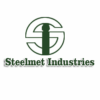When selecting a medium carbon steel for manufacturing shafts, axles, spindles, gears, or pins, C45 and its variants — C45E, C45S, and C45N — often come into consideration. While they may appear similar, there are key differences in composition, cleanliness, and intended applications.
In this article, Steelmet Industries offers a clear, professional comparison of these EN 10083-2 grades so that design engineers, buyers, and manufacturers can make informed choices.
🔍 What is C45 Steel?
C45 is a medium carbon, non-alloy steel known for its good tensile strength, toughness, and wear resistance. It is widely used for components that need to withstand moderate stress and impact, and can be hardened via heat treatment.
But as demand for better machinability, surface finish, and cleaner steel increased, variants like C45E, C45S, and C45N were introduced to meet specific needs.
🧪 Chemical Composition Comparison
| Property | C45 (General) | C45E | C45S | C45N |
|---|---|---|---|---|
| Carbon (C) | 0.42–0.50% | 0.42–0.50% | 0.42–0.50% | 0.42–0.50% |
| Manganese (Mn) | 0.50–0.80% | 0.50–0.80% | 0.50–0.80% | 0.50–0.80% |
| Phosphorus (P) max | 0.045% | 0.035% | 0.035% | 0.035% |
| Sulphur (S) max | 0.045% | 0.035% | 0.035% | 0.035% |
| Special Control | — | Low P & S | Machinability improved | Normalized condition |
📌 Key Differences Explained
C45 – Standard grade without any special requirements. Suitable for general use when price is a key factor.
C45E – “E” denotes special cleanliness, meaning lower phosphorus and sulphur content for better mechanical properties and weldability.
C45S – “S” denotes improved machinability, achieved by controlled addition of sulphur for faster turning and machining operations.
C45N – “N” indicates delivery in a normalized condition (controlled cooling), improving toughness and structural uniformity.
⚙️ Applications of C45 and Its Variants
| Application Type | Suitable Grade |
|---|---|
| General-purpose shafts | C45 |
| Precision-machined parts | C45S |
| Welded structures | C45E |
| Impact-resistant components | C45N |
These steels are used across automotive, agricultural, construction, and machinery manufacturing sectors.
🔧 Machining & Heat Treatment Summary
Hardening Temperature: ~820–860°C
Tempering Range: 550–700°C
Condition of Supply: Black bar, peeled, ground, or bright bar
Machinability: Best in C45S > C45E > C45
Weldability: Better in C45E due to controlled impurities
🏭 Availability from Steelmet Industries
Steelmet Industries offers C45 family grades in:
Rounds, Squares, Flats, Hexagons, and Custom Profiles
Hot Rolled, Peeled, Ground, and Bright Finishes
Fully compliant with EN 10083-2, with optional vacuum degassing (VD route) for critical applications
Customers across industries value our traceability, dimensional consistency, and support for both prototype and volume orders.
📞 Questions about material selection or finish?
Get expert guidance for your component design or sourcing needs.
📱 WhatsApp us at +91 712 2728071
📬 Or send us a message through our contact form.
We’re here to support your project — from concept to production.
🧠 Frequently Asked Questions (FAQ)
Q1: Can I use C45 instead of C45E or C45S?
A: For non-critical or low-cost applications, yes. But for precision machining or welding, C45E or C45S are more suitable.
Q2: Is there any price difference between these grades?
A: Yes, C45 is typically the most economical, while C45E and C45S may have a slight premium due to added processing.
Q3: Do you supply bright bars in C45E or C45S?
A: Yes. At Steelmet Industries, both grades are regularly supplied as bright drawn or ground bars with tight tolerances.
Q4: Are these grades available with vacuum degassing (VD route)?
A: Yes, we offer VD route options on request for improved quality and reliability, especially for forged or machined components.
📌 Summary
C45 and its variants — C45E, C45S, and C45N — may appear interchangeable at first glance, but each has its advantages. Selecting the right one can improve your machining efficiency, weld quality, or overall performance.
Design teams, purchase departments, and OEMs looking for dependable, quality-controlled steel will benefit from choosing the right grade — and the right partner.

